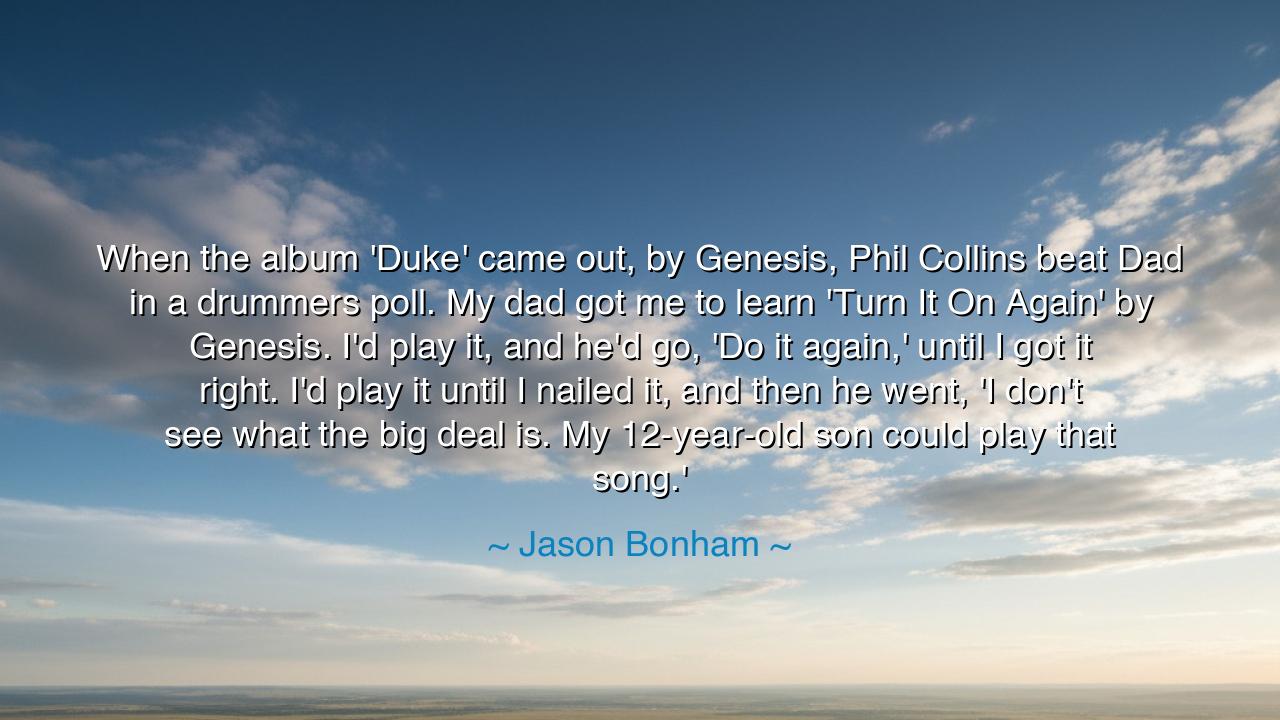
When the album 'Duke' came out, by Genesis, Phil Collins beat Dad
When the album 'Duke' came out, by Genesis, Phil Collins beat Dad in a drummers poll. My dad got me to learn 'Turn It On Again' by Genesis. I'd play it, and he'd go, 'Do it again,' until I got it right. I'd play it until I nailed it, and then he went, 'I don't see what the big deal is. My 12-year-old son could play that song.'






“When the album ‘Duke’ came out, by Genesis, Phil Collins beat Dad in a drummers poll. My dad got me to learn ‘Turn It On Again’ by Genesis. I'd play it, and he'd go, ‘Do it again,’ until I got it right. I'd play it until I nailed it, and then he went, ‘I don't see what the big deal is. My 12-year-old son could play that song.’” Thus spoke Jason Bonham, son of the legendary John Bonham, the thunderous drummer of Led Zeppelin. In this tale—part humor, part reverence—lies a story not merely of music, but of legacy, humility, and the eternal dialogue between father and son. Beneath the laughter of this memory, there beats a rhythm as ancient as humanity itself: the rhythm of inheritance, of one generation passing its flame to the next.
John Bonham, known to the world as a titan among drummers, was not simply a musician—he was a force of nature, a craftsman of sound who struck not only skins and cymbals, but the very pulse of rock and roll. His power was raw, elemental, born not of calculation but of instinct—blood and rhythm intertwined. When his son, Jason, recounts this story, it is more than a recollection of a musical exercise. It is a glimpse into how greatness shapes those who come after it. The father, though immortal in fame, does not teach with words of pride or superiority; he teaches through challenge, through discipline, through humor that humbles and inspires.
The lesson of this quote lies not in drumming, but in the way a master passes wisdom. When John Bonham tells his son, “Do it again,” he is not merely training his hands—he is awakening his will. He demands not perfection for its own sake, but the discipline that fuels mastery. Then, with a jest, he cuts away the pride that might accompany success: “My 12-year-old son could play that song.” In this paradox—a father diminishing his own triumph by uplifting his child—there is a deeper truth: that true greatness never fears being surpassed. The master smiles when his student begins to equal him.
The ancients would have understood this ritual of repetition and humility. In the workshops of Greece and Rome, young sculptors apprenticed under their fathers, chiseling marble until their hands bled, learning not only form but patience. Phidias, the sculptor of the gods, once taught his students that true art was not born of genius alone, but of endurance—of doing a thing again and again until it transcended craft and became divine. Jason’s story is a modern echo of this eternal principle: the path to mastery is forged through persistence, and humility keeps the spirit pure.
There is also tenderness hidden within John Bonham’s humor. His jest—light yet sharp—was not meant to mock, but to teach the virtue of perspective. For fame is fleeting, and polls and titles mean little in the face of enduring artistry. When he references Phil Collins beating him in a poll, he shows no bitterness—only playfulness, only love. This is the humility of the true artist, who knows that no competition can measure the soul of creation. He redirects that moment not toward rivalry, but toward teaching his son. Through this, he reminds us that art is not a contest, but a lineage, and that the joy of creation is greater than the applause of the crowd.
In this story, we also glimpse the eternal bond of mentorship and inheritance. Every generation looks to the one before it for guidance, and every parent, knowingly or not, becomes the mirror in which a child sees both their limits and their potential. Jason, by learning from his father, was not only mastering rhythm; he was inheriting the heartbeat of a family, a legacy carried through sound. And yet, as every wise teacher knows, the final task is to let the pupil stand on his own. In telling his son that a twelve-year-old could play the song, John was not belittling him—he was freeing him. He was saying: now you can do what others call difficult. You belong among those who make the impossible seem simple.
Thus, from this seemingly small anecdote, a greater wisdom emerges—that mastery is not a destination, but a dialogue between generations. The father teaches through example, the son learns through effort, and both are bound by the music that transcends words. True greatness, as John Bonham showed, lies not in proving superiority, but in igniting greatness in others.
So let this be the teaching for all who seek mastery: do it again. Whatever your craft, whatever your calling, approach it with the same relentless spirit—with discipline, patience, and humility. And when at last you succeed, remember the laughter in John Bonham’s lesson. For the moment you think yourself beyond learning, you cease to grow. Let love, humor, and persistence be your rhythm, and your legacy will echo—like a perfect drumbeat—through the hearts of those who follow.






AAdministratorAdministrator
Welcome, honored guests. Please leave a comment, we will respond soon